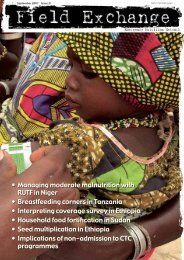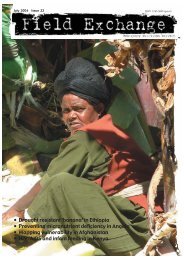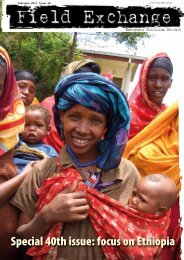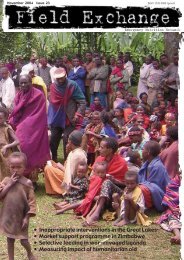Scoop situation - Field Exchange - Emergency Nutrition Network
Scoop situation - Field Exchange - Emergency Nutrition Network
Scoop situation - Field Exchange - Emergency Nutrition Network
- No tags were found...
Create successful ePaper yourself
Turn your PDF publications into a flip-book with our unique Google optimized e-Paper software.
<strong>Field</strong> Articlea) Much clearer instructions that avoid confusionand miscalculations and that explainhow much water to add to each red scoopand the resulting volume of feed.Instructions could include a chart of precalculationsfor 1, 2, 3 scoops, etc.b) A scoop that accurately measures onequarter of a sachet (perhaps a blue scoopfor F100 sachets and an orange scoop forF75 sachets to co-ordinate with respectivebox and sachet colours) with clear instructionsthat explain how many scoops to use,how much water to add and the resultingvolume of feed (instructions should detailhow to make one quarter and one half of asachet).For more information, contact:Chloe Angood, Institute of Human <strong>Nutrition</strong>,University of Southampton,email:c.angood@soton.ac.ukFeed preparation instructions on thewall in one hospital before the training– these are copied from the NutrisetinstructionsThe reorganised feeding stationwith new, clear instructions,after the trainingC Angood, Tanzania, 2007Regionalworkshop onIFE in Bali 2008A three day strategy workshop/one day trainingon Infant and Young Child Feeding inEmergencies (IFE) is scheduled to be held inBali, Indonesia on 10-13th March, 2008. Thisworkshop is being organised under theauspices of the Inter Agency StandingCommittee (IASC) Global <strong>Nutrition</strong> Cluster 1that is led by UNICEF. Within the cluster, themain organiser is the IFE Core Group 2 , incooperation with UNICEF East Asia andPacific Regional Office, UNICEF South AsiaRegional Office and the Ministry of Health,Indonesia. The <strong>Emergency</strong> <strong>Nutrition</strong> <strong>Network</strong>(ENN) as co-ordinator and representative 3 ofthe IFE Core Group is co-facilitating this workshop.The workshop is funded by the Global<strong>Nutrition</strong> Cluster and by contributions and inkindsupport of IFE Core Group members.This strategy workshop on IFE has been identifiedas a key step to help improve coordination,policy guidance, implementation andresponse capacity in the region. The focus ofthe workshop is on emergency preparednessand improving the early response to protectand support IFE. Indonesia was chosen as thehosting country in order to learn from theirIFE experiences in the recent tsunami andearthquake responses.The workshop will bring together participantsfrom a mixture of key government, UN,donor, international and local NGO representativesfrom 16 countries – Afghanistan,Bangladesh, Cambodia, China, India,Indonesia, Maldives, Myanmar, Nepal,Pakistan, Papua New Guinea, Philippines, SriNewsLanka, Thailand, Timor-Leste and Viet Nam.The objectives of the meeting are to:• Increase awareness of the importance of IFEin the region, including orientation on relevantpolicy, guidance and key issues in IFE• Identify key constraints to providing earlysupport and protection for appropriateinfant feeding practices in emergencies, and• Identify strategic directions and practicalsteps to address these at country andregional levels.Further information and an agenda are availableon the ENN website and from the keymeeting contact (below). A summary of themeeting report and of experiences shared atthe workshop will feature in future issues of<strong>Field</strong> <strong>Exchange</strong>.For further information, contact:Ali Maclaine, tel (UK): +44 (0)20 8989 5735fax: +44(0) 1865 324997email: alimaclaine@btinternet.comor Marie McGrath, ENN,email: marie@ennonline.netThe Operational Guidance on Infant and YoungChild Feeding in Emergencies (v2.1, Feb 2007) isnow available in Bahasa (Indonesia), Japanese andChinese, online at http://www.ennonline.net/ife1http://www.humanitarianreform.org/2The IFE Core Group is an inter-agency collaboration thatcomprises UNICEF, UNHCR, WFP, WHO, <strong>Emergency</strong><strong>Nutrition</strong> <strong>Network</strong> (ENN), Action Contre la Faim and CAREUSA. It is co-ordinated by the ENN.3The ENN/IFE Core Group is a member of the UNICEF-ledIASC Global <strong>Nutrition</strong> Cluster on behalf of the IFE CoreGroup and highlights IFE issues in global cluster activities.tions best adapted to the context of humanitariannutrition interventions. Having readChloe Angood’s article in this issue of <strong>Field</strong><strong>Exchange</strong> it is clear that further work needsto be done in order to facilitate the use of F-75 and F-100 therapeutic milk by nutritionistsin the field. Nutriset would like toacknowledge the great value of the workdone by this research group.Nutriset would like to invite organisationsand individuals that train and/ormanage therapeutic feeding programmeswithin health structures in the developingworld to contact us, as we would be verypleased to explore new means of improvement.Nutriset will welcome solutions toimprove packaging of F-75 and F-100, aswell as its other products for the treatment/preventionof malnutrition. Our teamwill work to clarify instructions accompanyingred scoops to enable everyone tocomprehend the quantities of scoopsneeded per quantity of water to make upthe different volumes of feed.For more information, contact:Mamane Zeilani, Nutriset,email:mzeilani@nutriset.fr ornutriset@nutriset.frThe Humanitarian Response IndexSummary of published news 1A recent news piece in the Lancet covered thelaunch by Kofi Annan, former UN SecretaryGeneral, of an index that ranks 23 countries inthe Organisation for Economic Co-operation(OECD) according to their effectiveness inhumanitarian donorship. The HumanitarianResponse Index aims to make donors moreaccountable by ranking them according to 57indicators that reflect the principles and goodpractices that govern humanitarian action.The Indicators are focused around fivethemes – responding to humanitarian needs,integrating relief and development, workingwith humanitarian partners, implementinginternational guiding principles, and promotinglearning and accountability. The outcomesare based on hard data and the views of varioushumanitarian agencies working on theground in eight countries.According to the index, Sweden is the mosteffective donor and Greece is the least effective.The wide-ranging indicators also high-light where donors could ‘do a lot better’. Forexample, the UK is ranked ninth andalthough it scores well in the amount ofmoney given and its speedy response tohumanitarian crises, it is let down by having apoor human rights record.The authors conclude that this new index is auseful “report card on donor activity” but itwill only be truly effective if it inspires donorsto improve their humanitarian donorshiprecord. Individual citizens, civil society, nongovernmentalorganisations, and politiciansshould use this new tool to hold their governmentsto account.For more on the Humanitarian ResponseIndex, visit the website of DevelopmentAssistance Research Associates (DARA) whohave devised the index,http://www.daraint.org/1The Humanitarian Response Index. The Lancet - Vol.370, Issue 9603, 8 December 2007, Page 1880. Registerfor access to full text at http://www.thelancet.com14
















